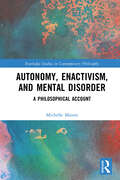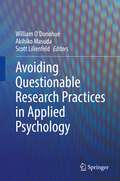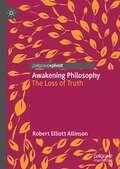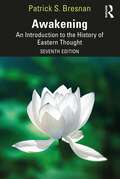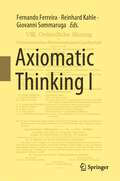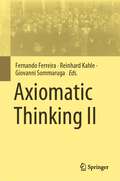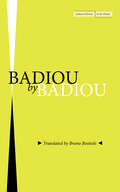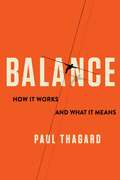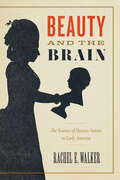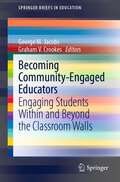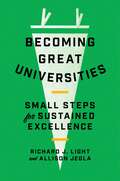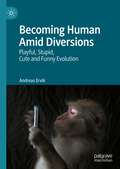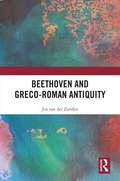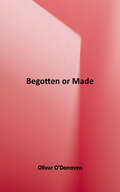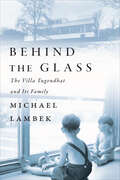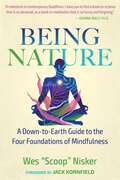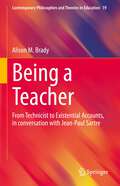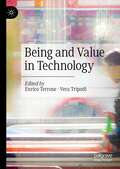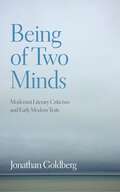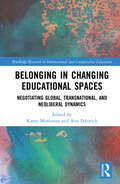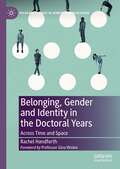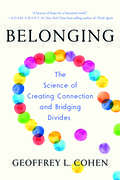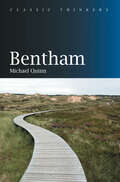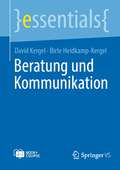- Table View
- List View
Autonomy, Enactivism, and Mental Disorder: A Philosophical Account (Routledge Studies in Contemporary Philosophy)
by Michelle MaieseThis book brings together insights from the enactivist approach in philosophy of mind and existing work on autonomous agency from both philosophy of action and feminist philosophy. It then utilizes this proposed account of autonomous agency to make sense of the impairments in agency that commonly occur in cases of dissociative identity disorder, mood disorders, and psychopathy. While much of the existing philosophical work on autonomy focuses on threats that come from outside the agent, this book addresses how inner conflict, instability of character, or motivational issues can disrupt agency. In the first half of the book, the author conceptualizes what it means to be self-governing and to exercise autonomous agency. In the second half, she investigates the extent to which agents with various forms of mental disorder are capable of exercising autonomy. In her view, many forms of mental disorder involve disruptions to self-governance, so that agents lack sufficient control over their intentional behavior or are unable to formulate and execute coherent action plans. However, this does not mean that they are utterly incapable of autonomous agency; rather, their ability to exercise this capacity is compromised in important respects. Understanding these agential impairments can help to deepen our understanding of what it means to exercise autonomy, and also devise more effective treatments that restore subjects’ agency. Autonomy, Enactivism, and Mental Disorder will be of interest to researchers and advanced students working in philosophy of mind, philosophy of action, philosophy of psychiatry, and feminist philosophy.
Avoiding Questionable Research Practices in Applied Psychology
by Scott Lilienfeld Akihiko Masuda William O’DonohueThis authoritative volume presents a detailed analysis of the replication crisis and the use of questionable research practices (QRPs) in psychology, as well as recommended practices for combatting these problems. Ultimately, the book aims to provide a comprehensive, current, and accessible account of the adverse effects of QRPs.The replication crisis in psychology and allied fields has exposed critical flaws in the standard views of research methods, which allow for extensive flexibility in data analysis by investigators and permit the widespread use of QRPs. Chapters examine the intentional use of QRPs such as data fabrication and falsification, along with subtler, unintentional practices such as p-hacking and HARKING (hypothesizing after results are known). Drawing on the growing awareness of these problems, contributors also highlight potential strategies to detect QRPs and minimize their negative impact through open data practices, preregistration of hypotheses and analyses, and adversarial collaborations, in which investigators holding opposing positions on a scientific issue agree to work together on a study in an effort to counteract their respective biases. Among the topics covered:History of controversies in statistics and replicationEmbracing intellectual humility while designing researchConfirmatory vs. exploratory analysesPublication bias and negative resultsPromoting honest and transparent report writingAvoiding Questionable Research Practices in Applied Psychology provides a deeper understanding of how QRPs impede the reliability and trustworthiness of findings in psychology and the social sciences. It will be a practical, useful resource for students and instructors in graduate and advanced undergraduate level research methods classes, along with psychological researchers interested in improving their own research.
Awakening Philosophy: The Loss of Truth
by Robert Elliott AllinsonIn this original book, Robert Elliott Allinson asserts that philosophers have been lulled into a dogmatic sleep by Immanuel Kant, the slayer of metaphysics, who has convinced them (and the rest of humanity) that we can never know Reality. Allinson awakens global philosophers from their sceptical slumbers by diagnosing the reason why they have abdicated their traditional calling as leaders of inquiry into truth and wisdom.
Awakening: An Introduction to the History of Eastern Thought
by Patrick S. BresnanAwakening: An Introduction to the History of Eastern Thought provides the reader with a thorough and valuable overview of the historical development of the major Eastern religious and philosophical traditions, primarily in India, China, and Japan. The book is written in an engaging style that contains a variety of anecdotes, analogies, definitions, and supporting quotes from primary and secondary sources. Awakening helps the reader to recognize the interrelationships that exist among the various traditions, to appreciate the relevance of these traditions to the concerns of modern times, and to understand the major issues of interpretation regarding these traditions. The primary focus of Awakening is Hinduism and Buddhism, and they serve as the broad umbrellas that include a number of specific schools, each of which is treated individually. Other schools–such as Confucianism, Daoism, and Shinto–are included at the appropriate place. Awakening is for all students and interested readers, whether new to the study of Eastern thought or not. New to the Seventh Edition:- A new Introduction- A clearer definition and explanation of "Yoga" (throughout Part 1)- A rewrite of the Aryan Migration section in Chapter 1, bringing it in line with current research- An added sub-chapter to Chapter 6, dealing with Kundalini Yoga- Further clarification of the meaning of Anatman in Chapter 10- Emphasis on the contribution of Daoism to Chan Buddhism- Clearer presentation of the Life of Buddha (Legend vs. Reality)- Updated Study Questions- Two new videos added to the companion website Key Features:- An historical overview that attempts to show the development of Eastern philosophies, both within the individual traditions as well as within a broad but loosely unified system of thought- Abundantly uses stories in chapter overviews to engage student readers and to better explain Eastern thought- No background in Asian studies, philosophy, or religious studies is presumed, allowing any student to greatly benefit from reading this book- A functional, visually attractive web site www.patrickbresnan.com with author-produced videos on the content of the book, scores of pictures, and a comprehensive section on meditation
Axiomatic Thinking I
by Giovanni Sommaruga Reinhard Kahle Fernando FerreiraIn this two-volume compilation of articles, leading researchers reevaluate the success of Hilbert's axiomatic method, which not only laid the foundations for our understanding of modern mathematics, but also found applications in physics, computer science and elsewhere.The title takes its name from David Hilbert's seminal talk Axiomatisches Denken, given at a meeting of the Swiss Mathematical Society in Zurich in 1917. This marked the beginning of Hilbert's return to his foundational studies, which ultimately resulted in the establishment of proof theory as a new branch in the emerging field of mathematical logic. Hilbert also used the opportunity to bring Paul Bernays back to Göttingen as his main collaborator in foundational studies in the years to come.The contributions are addressed to mathematical and philosophical logicians, but also to philosophers of science as well as physicists and computer scientists with an interest in foundations.Chapter 8 is available open access under a Creative Commons Attribution 4.0 International License via link.springer.com.
Axiomatic Thinking II
by Giovanni Sommaruga Reinhard Kahle Fernando FerreiraIn this two-volume compilation of articles, leading researchers reevaluate the success of Hilbert's axiomatic method, which not only laid the foundations for our understanding of modern mathematics, but also found applications in physics, computer science and elsewhere.The title takes its name from David Hilbert's seminal talk Axiomatisches Denken, given at a meeting of the Swiss Mathematical Society in Zurich in 1917. This marked the beginning of Hilbert's return to his foundational studies, which ultimately resulted in the establishment of proof theory as a new branch in the emerging field of mathematical logic. Hilbert also used the opportunity to bring Paul Bernays back to Göttingen as his main collaborator in foundational studies in the years to come.The contributions are addressed to mathematical and philosophical logicians, but also to philosophers of science as well as physicists and computer scientists with an interest in foundations.
Badiou by Badiou (Cultural Memory in the Present)
by Alain BadiouAn accessible introduction to Badiou's key ideas In this short and accessible book, the French philosopher Alain Badiou provides readers with a unique introduction to his system of thought, summed up in the trilogy of Being and Event, Logics of Worlds, and The Immanence of Truths. Taking the form of an interview and two talks and keeping in mind a broad audience without any prior knowledge of his work, the book touches upon the central concepts and major preoccupations of Badiou's philosophy: fundamental ontology, mathematics, politics, poetry, and love. Well-chosen examples illuminate his thinking in regards to being and universality, worlds and singularity, and the infinite and the absolute, among other topics. A veritable tour de force of pedagogical clarity, this new student-friendly work is perhaps the single best general introduction to the work of this prolific and committed thinker. If, for Badiou, the task of philosophy consists in thinking through the truths of our time, the texts collected in this small volume could not be timelier.
Balance: How It Works and What It Means
by Paul ThagardLiving is a balancing act. Ordinary activities like walking, running, or riding a bike require the brain to keep the body in balance. A dancer’s poised elegance and a tightrope walker’s breathtaking performance are feats of balance. Language abounds with expressions and figures of speech that invoke balance. People fret over work-life balance or try to eat a balanced diet. The concept crops up from politics—checks and balances, the balance of power, balanced budgets—to science, in which ideas of equilibrium are crucial. Why is balance so fundamental, and how do physical and metaphorical balance shed light on each other?Paul Thagard explores the physiological workings and metaphorical resonance of balance in the brain, the body, and society. He describes the neural mechanisms that keep bodies balanced and explains why their failures can result in nausea, falls, or vertigo. Thagard connects bodily balance with leading ideas in neuroscience, including the nature of consciousness. He analyzes balance metaphors across science, medicine, economics, the arts, and philosophy, showing why some aid understanding but others are misleading or harmful. Thagard contends that balance is ultimately a matter of making sense of the world. In both literal and metaphorical senses, balance is what enables people to solve the puzzles of life by turning sensory signals or an incongruous comparison into a coherent whole.Bridging philosophy, psychology, and neuroscience, Balance shows how an unheralded concept’s many meanings illuminate the human condition.
Beauty and the Brain: The Science of Human Nature in Early America
by Rachel E. WalkerExamining the history of phrenology and physiognomy, Beauty and the Brain proposes a bold new way of understanding the connection between science, politics, and popular culture in early America. Between the 1770s and the 1860s, people all across the globe relied on physiognomy and phrenology to evaluate human worth. These once-popular but now discredited disciplines were based on a deceptively simple premise: that facial features or skull shape could reveal a person’s intelligence, character, and personality. In the United States, these were culturally ubiquitous sciences that both elite thinkers and ordinary people used to understand human nature. While the modern world dismisses phrenology and physiognomy as silly and debunked disciplines, Beauty and the Brain shows why they must be taken seriously: they were the intellectual tools that a diverse group of Americans used to debate questions of race, gender, and social justice. While prominent intellectuals and political thinkers invoked these sciences to justify hierarchy, marginalized people and progressive activists deployed them for their own political aims, creatively interpreting human minds and bodies as they fought for racial justice and gender equality. Ultimately, though, physiognomy and phrenology were as dangerous as they were popular. In addition to validating the idea that external beauty was a sign of internal worth, these disciplines often appealed to the very people who were damaged by their prejudicial doctrines. In taking physiognomy and phrenology seriously, Beauty and the Brain recovers a vibrant—if largely forgotten—cultural and intellectual universe, showing how popular sciences shaped some of the greatest political debates of the American past.
Beauty and the Brain: The Science of Human Nature in Early America
by Rachel E. WalkerExamining the history of phrenology and physiognomy, Beauty and the Brain proposes a bold new way of understanding the connection between science, politics, and popular culture in early America. Between the 1770s and the 1860s, people all across the globe relied on physiognomy and phrenology to evaluate human worth. These once-popular but now discredited disciplines were based on a deceptively simple premise: that facial features or skull shape could reveal a person’s intelligence, character, and personality. In the United States, these were culturally ubiquitous sciences that both elite thinkers and ordinary people used to understand human nature. While the modern world dismisses phrenology and physiognomy as silly and debunked disciplines, Beauty and the Brain shows why they must be taken seriously: they were the intellectual tools that a diverse group of Americans used to debate questions of race, gender, and social justice. While prominent intellectuals and political thinkers invoked these sciences to justify hierarchy, marginalized people and progressive activists deployed them for their own political aims, creatively interpreting human minds and bodies as they fought for racial justice and gender equality. Ultimately, though, physiognomy and phrenology were as dangerous as they were popular. In addition to validating the idea that external beauty was a sign of internal worth, these disciplines often appealed to the very people who were damaged by their prejudicial doctrines. In taking physiognomy and phrenology seriously, Beauty and the Brain recovers a vibrant—if largely forgotten—cultural and intellectual universe, showing how popular sciences shaped some of the greatest political debates of the American past.
Becoming Community-Engaged Educators: Engaging Students Within and Beyond the Classroom Walls (SpringerBriefs in Education)
by Graham V. Crookes George M. JacobsThis book puts forth a call to engagement for educators at all levels of education and in all subject areas, with a focus on language education. Through using a grounded theory approach, it features semi-structured interviews, in a qualitative approach, with educators who embody community engaged education. Each chapter encompasses a case study that examines the interviewee's motivations, strategies, successes and failures. This book presents a local theory of community-engaged teachers and researchers to assist educators in developing as a community-engaged teacher or researcher. It asks and attempts to answer critical questions concerning the initial induction into community engagement, the maintenance of energy, commitment, and motivation, and the role of support networks. Through these, this book examines what is needed to sustain such an identity, and support campaigns of action or individual engagement over both the short and long term.
Becoming Great Universities: Small Steps for Sustained Excellence
by Richard J. Light Allison JeglaHow campus communities of every kind can transform themselves from good to greatBecoming Great Universities highlights ten core challenges that all colleges and universities face and offers practical steps that everyone on campus—from presidents to first-year undergraduates—can take to enhance student life and learning.This incisive book, written in a friendly and engaging style, draws on conversations with presidents, deans, and staff at hundreds of campuses across the country as well as scores of in-depth interviews with students and faculty. Providing suggestions that all members of a campus community can implement, Richard Light and Allison Jegla cover topics such as how to build a culture of innovation on campus, how to improve learning outcomes through experimentation, how to help students from under-resourced high schools succeed in college, and how to attract students from rural areas who may not be considering colleges far from their communities. They offer concrete ways to facilitate constructive interactions among students from different backgrounds, create opportunities for lifelong learning and engagement, and inspire students to think globally. And most of the ideas presented in this book can be implemented at little to no cost.Featuring a wealth of evidence-based examples, Becoming Great Universities offers actionable suggestions for everyone to have a positive impact on college life regardless of whether their campus is urban or rural, private or public, large or small, wealthy or not.
Becoming Human Amid Diversions: Playful, Stupid, Cute and Funny Evolution.
by Andreas ErvikThis book develops a philosophy of the predominant yet obtrusive aspects of digital culture, arguing that what seems like insignificant distractions of digital technology - such as video games, mindless browsing, cute animal imagery, political memes, and trolling - are actually keyed into fundamental aspects of evolution. These elements are commonly framed as distractions in an economy of attention and this book approaches them with the prospect of understanding their attraction, from the starting point of diversions. Diversions designate not simply shifting states of attention but characterize the direction of any system on a different course, a theoretical perspective which makes it possible to investigate distractions as not only by-products of contemporary media and human attention. The perspective shifts from distractions as the unwanted and inconsequential to considering instead the function of diversions in the process of evolutionary development. Grounded in media theory but drawing from diverse interdisciplinary perspectives in biology, philosophy, and systems theory, this book provocatively theorizes the process of diversions – of the playful, stupid, cute, and funny – as significant for the evolution of a range of organisms.
Beethoven and Greco-Roman Antiquity
by Jos van ZandenLudwig van Beethoven had a life beyond music. He considered it his duty to spend leisure-time improving his Bildung (sophistication). To this end he familiarised himself with tangible manifestations of Greco-Roman antiquity, for he perceived these cultures and their representatives as examples of intellectual, moral, and artistic perfection. He consumed such writers as Homer, Plutarch, Horace, Tacitus, Euripides, and Greek poets. These texts were morally uplifting for him, and advantageous for building character. They now hold a key to Beethoven’s ideal of a steadfast, austere, and Stoic outlook, necessary for a ‘great man’ to carry out his duties. Jos van der Zanden demonstrates that Beethoven’s engagement with Greco-Roman culture was deep and ongoing, and that it ventured beyond the non-committal. Drawing on a comprehensive investigation of primary sources (letters, conversation books, diaries, recollections of contemporaries) he examines what Beethoven knew of such topics like history, art, politics, and philosophy of antiquity. The book presents new information on the composer’s republicanism, his familiarity with the works of Plato, his admiration of the elderly Brutus, his plan to utilize ‘unresolved dissonances’ in an unknown piece of music, and his decision to subscribe to a book about ancient Greek poetry. A hitherto unknown vocal piece based on lines by Euripides is revealed. The study concludes with a comprehensive survey of all compositions and sketches by Beethoven based on Greco-Roman subjects.
Begotten or Made?
by Oliver O'DonovanHow is it that we have so lost sight of the meaning of the human person that our very biological sex is seen as just another medical problem to be solved by technique? In a society that has rejected all moral norms, that refuses to honor God as Creator, what hope do we have of stemming the tide of scientific intervention into even the most sacred dimensions of our humanity? In this prescient volume, originally published in 1984, the eminent theological ethicist Oliver O’Donovan offers a penetrating analysis of our confusion over human nature and the proper boundaries of medical science. <p><p> O’Donovan exposes the assumptions that underlie new technologies that presume to “make” human life, and offers Christians the philosophical clarity they need to navigate the torrent of increasingly baffling ethical questions they face. <p><p> Today we need this wisdom more than ever, which is why the Davenant Institute is proud to be publishing this affordable new edition for the 21st century, complete with a new introduction by Matthew Lee Anderson and a retrospective by the author.
Behind the Glass: The Villa Tugendhat and Its Family
by Michael LambekThe Villa Tugendhat, designed by Mies van der Rohe in 1928, is an icon of architectural modernism and a UNESCO World Heritage site. Behind the Glass tells the true story of the large family connected to it, who rose to prominence through industrial textile manufacturing. The book traces the transformations in the life of the family, from their roots in a Jewish ghetto to part of the wealthy bourgeoisie in the Austro-Hungarian Empire to adaptation in interwar independent Czechoslovakia and flight in the face of Nazi invasion. Michael Lambek examines the generation born in the first decade of the twentieth century, especially Grete Tugendhat – Lambek’s maternal grandmother – who commissioned, inhabited, championed, and relinquished the distinctive modern house. An exploration of life in and surrounding the Villa Tugendhat offers a factual portrait that runs counter to the fictional one portrayed in Simon Mawer’s The Glass Room. The book also provides unpublished correspondence between Martin Heidegger and Ernst Tugendhat, Grete’s son, as well as a description of the impact of a 2017 family reunion. Behind the Glass reflects on the meaning of a "family" and suggests that it is more than a nuclear household – a family reproduces itself over generations, a product of how it represents itself and is represented by others.
Being Nature: A Down-to-Earth Guide to the Four Foundations of Mindfulness
by Wes Nisker• Provides a practical program, complete with enjoyable, even playful meditations, for realizing greater self-awareness, increased wisdom, and happiness• Shows how recent discoveries in physics, evolutionary biology, and psychology express in scientific terms the same insights the Buddha discovered more than 2,500 years ago• Reveals the origins of attachments, desires, emotions, and thoughts in our own bodiesTaking us on an evolutionary journey to find the origins of emotions, desires, and thoughts in our own bodies, Wes &“Scoop&” Nisker shows not only how cutting-edge science is proving the tenets of the Buddha but also how we can interpret the traditional practices of Buddhism through this scientific lens for more personal freedom and peace of mind. Using the traditional Buddhist meditation series of the Four Foundations of Mindfulness as a framework, Nisker offers a witty narrative along with practical meditations and exercises to train the mind to overcome painful conditioning and gain greater self-awareness, increased wisdom, and happiness. He shows how recent discoveries in physics, evolutionary biology, and psychology express in scientific terms the same insights the Buddha discovered more than 2,500 years ago, such as the impermanence of the body, where thoughts come from, and how the body communicates within itself. Presenting a variety of new ways to harness the power of mindfulness to transform our understanding of both ourselves and the world, Nisker teaches us how to put our understanding of evolution in the service of spiritual awakening.
Being a Teacher: From Technicist to Existential Accounts, in conversation with Jean-Paul Sartre (Contemporary Philosophies and Theories in Education #19)
by Alison M. BradyThis book re-conceptualizes teaching through an engagement with Jean-Paul Sartre’s early existentialist thought. Against the grain of teacher accountability, it turns to the demanding account of being human in Sartre’s thought, on the basis of which an alternative account of teaching can be developed. It builds upon Sartre’s key concepts related to the self, freedom, bad faith, and the Other, such that they might open up original ways of thinking about the practices of teaching. Indeed, given the everyday complexities that characterize teaching, as well as the vulnerabilities and uncertainty that it so often involves, this book ultimately aims to create a space in which to reimagine forms of accounting that move from technicist ways of thinking to existential sensitivity in relation to one’s practice as a teacher.
Being and Value in Technology
by Enrico Terrone Vera TripodiDespite numerous publications on the philosophy of technology, little attention has been paid to the relationship between being and value in technology, two aspects which are usually treated separately. This volume addresses this issue by drawing connections between the ontology of technology on the one hand and technology’s ethical and aesthetic significance on the other. The book first considers what technology is and what kind of entities it produces. Then it examines the moral implications of technology. Finally, it explores the connections between technology and the arts.
Being of Two Minds: Modernist Literary Criticism and Early Modern Texts
by Jonathan GoldbergBeing of Two Minds examines the place that early modern literature held in Modernist literary criticism. For T. S. Eliot, Virginia Woolf, and William Empson, the early modern period helps model a literary future. At stake in their engagements across time were ontological questions about literature and its ability to mediate between the one and the many, the particular and the general, life and death, the past and the present. If reading and writing literature enables the mind to be in two places at once, creative experience serves as a way to participate in an expanded field of consciousness alongside mortality.Goldberg reads the readings that these modernists performed on texts that Eliot claimed for the canon like the metaphysical poets and Jacobean dramatists, but also Shakespeare, Milton, Montaigne, and Margaret Cavendish. Ontological concerns are reflected in Eliot’s engagement with Aristotle’s theory of the soul and Empson’s Buddhism. These arguments about being affect minds and bodies and call into question sexual normativity: Eliot glances at a sodomitical male-male mode of literary transmission; Woolf produces a Judith Shakespeare to model androgynous being; Empson refuses to distinguish activity from passivity to rewrite gender difference.The work of one of our leading literary and cultural critics, Being of Two Minds spans centuries to show how the most compelling and surprising ideas about mind, experience, and existence not only move between early modernity, high modernism, and our own moment, but are also constituted through that very movement between times and minds.
Belonging in Changing Educational Spaces: Negotiating Global, Transnational, and Neoliberal Dynamics (Routledge Research in International and Comparative Education)
by Karen Monkman Ann FrkovichThis book explores the impacts on personal and professional, local and global forms of belonging in educational spaces amidst rapid changes shaped by globalization. Encouraging readers to consider the idea of belonging as an educational goal as much as a guiding educational strategy, this text forms a unique contribution to the field. Drawing on empirical and theoretical analyses, chapters illustrate how educational experience informs a sense of belonging, which is increasingly juxtaposed against a variety of global dynamics including neoliberalism, transnationalism, and global policy and practice discourses. Addressing phenomena such as refugee education, large-scale international assessments, and study abroad, the volume’s focus on ten countries including Japan, Sierra Leone, and the US demonstrates the complexities of globalization and illuminates possibilities for supporting new constructions of belonging in rapidly globalizing educational spaces. This text will benefit researchers, academics, and educators with an interest in international and comparative education, multicultural education, and educational policy more broadly. Those interested in the sociology of education and cultural studies within education will also benefit from this volume.
Belonging, Gender and Identity in the Doctoral Years: Across Time and Space (Palgrave Studies in Gender and Education)
by Rachel HandforthThis book uses belonging as a lens through which to understand women students’ experiences of studying for a doctorate, exploring the impact of academic cultures on career aspirations. Drawing on discourses of neoliberalism and academic identities, it makes a valuable contribution to ongoing discussions of gender inequality in the academy. Based on data gathered from women doctoral students in the UK, this book offers a contemporary, research-informed understanding of the doctorate as an inherently gendered experience, which has implications for individuals, academic institutions, and for the future of the academic sector. The book will be of interest to academics working in the area of doctoral education, doctoral supervisors and those involved in doctoral student support, including researcher developers and individuals working in graduate schools, as well as doctoral students themselves.
Belonging: The Science of Creating Connection and Bridging Divides
by Geoffrey L. CohenFinalist for The Next Big Idea Bookclub • Book of the Year Selection Behavioral Scientist and Greater Good Society “This is perhaps the richest book on belonging you’ll ever read.… The inspiration one draws from every page of this book is an enhanced sense of what is possible. It revives the very thing we need most in these times: hope.” —Claude M. Steele, author of Whistling Vivaldi Discover the secret to flourishing in an age of division: belonging. In a world filled with discord and loneliness, finding harmony and happiness can be difficult. But what if the key to unlocking our potential lies in this deceptively simple concept? Belonging is the feeling of being a part of a group that values, respects, and cares for us—a feeling that we can all cultivate in even the smallest corners of social life. In Belonging: The Science of Creating Connection and Bridging Divides, Stanford University professor Geoffrey L. Cohen draws on his own and others’ groundbreaking scientific research to offer simple, concrete solutions for fostering a sense of belonging. These solutions can generate surprisingly significant and long-lasting benefits. Small but powerful actions can bolster belonging—actions such as encouraging people to reflect on their core values before they face a challenge or expressing belief in someone’s capacity to reach a higher standard. A wide range of innovative approaches have been found to boost achievement at work and at school, bridge political divides, reduce prejudice, and even contribute to overall health. Rigorously tested in diverse arenas—from classrooms to disadvantaged neighborhoods to iconic Silicon Valley companies—these methods offer a path forward in these demanding times. Belonging is a compelling read for all who yearn for a more connected world, whether you’re a manager or employee, an educator or student, a parent or caregiver, or simply someone seeking to make the most out of every moment you spend with others. Packed with actionable insights and specific strategies, this book offers hope and practical guidance, serving as both an inspiration and a roadmap to creating a world of inclusion, understanding, and empathy.
Bentham (Classic Thinkers)
by Michael QuinnJeremy Bentham – philosopher, theorist of law and of the art of government – was among the most influential figures of the early nineteenth century, and the approach he pioneered – utilitarianism – remains central to the modern world. In this new introduction to his ideas, Michael Quinn shows how Bentham sought to be an engineer or architect of choices and to illuminate the methods of influencing human conduct to good ends, by focusing on how people react to the various physical, legal, institutional, normative and cultural factors that confront them as decision-makers. Quinn examines how Bentham adopted utility as the critical standard for the development and evaluation of government and public policy, and explains how he sought to apply this principle to a range of areas, from penal law to democratic reform, before concluding with an assessment of his contemporary relevance. He argues that Bentham simultaneously sought both to facilitate the implementation of governmental will and to expose misrule by rendering all exercises of public power transparent to the public on whose behalf it was exercised. This book will be essential reading for any student or scholar of Bentham, as well as those interested in the history of political thought, philosophy, politics, ethics and utilitarianism.
Beratung und Kommunikation (essentials)
by David Kergel Birte Heidkamp-KergelDer vorliegende Band liefert eine kurze und praxisorientierte Einführung in Beratungs- und Kommunikationsstrategien. Dabei stehen lösungsorientierte Formen der Kommunikation sowie praxisorientierten Übungen im Fokus der Darstellung. So werden v.a. Strategien vermittelt, die ressourcenorientiert die Potenziale und Stärken der Gesprächspartner*innen adressieren. Neben Kommunikationsmodellen zur Konfliktlösung werden daher Beratungsansätze und Fragestrategien praxisorientiert dargestellt, durch die Stärken identifiziert, Ressourcen aktiviert und Wachstumspotenziale freigelegt werden können.Den kostenlosen Zugang zum Online-Kurs finden Sie direkt im Buch.
